Choosing the right material to tie up tomato plants can be a perplexing task for many gardeners. Although many years ago it was common practice to pull out a snagged pair of pantyhose from the dresser drawer to use to support your tomato branches, this practice is no longer practical for most people.
Not only is it rare to have any supply of them around these days, the better news is that there are many more options available today that are better for supporting your plants. And many of the choices are also reusable year after year.
The real key to success is to avoid some of the options that may actually hinder the growth and production of your tomato plants. So how do you know what the best materials are to use to tie up your tomato plants?
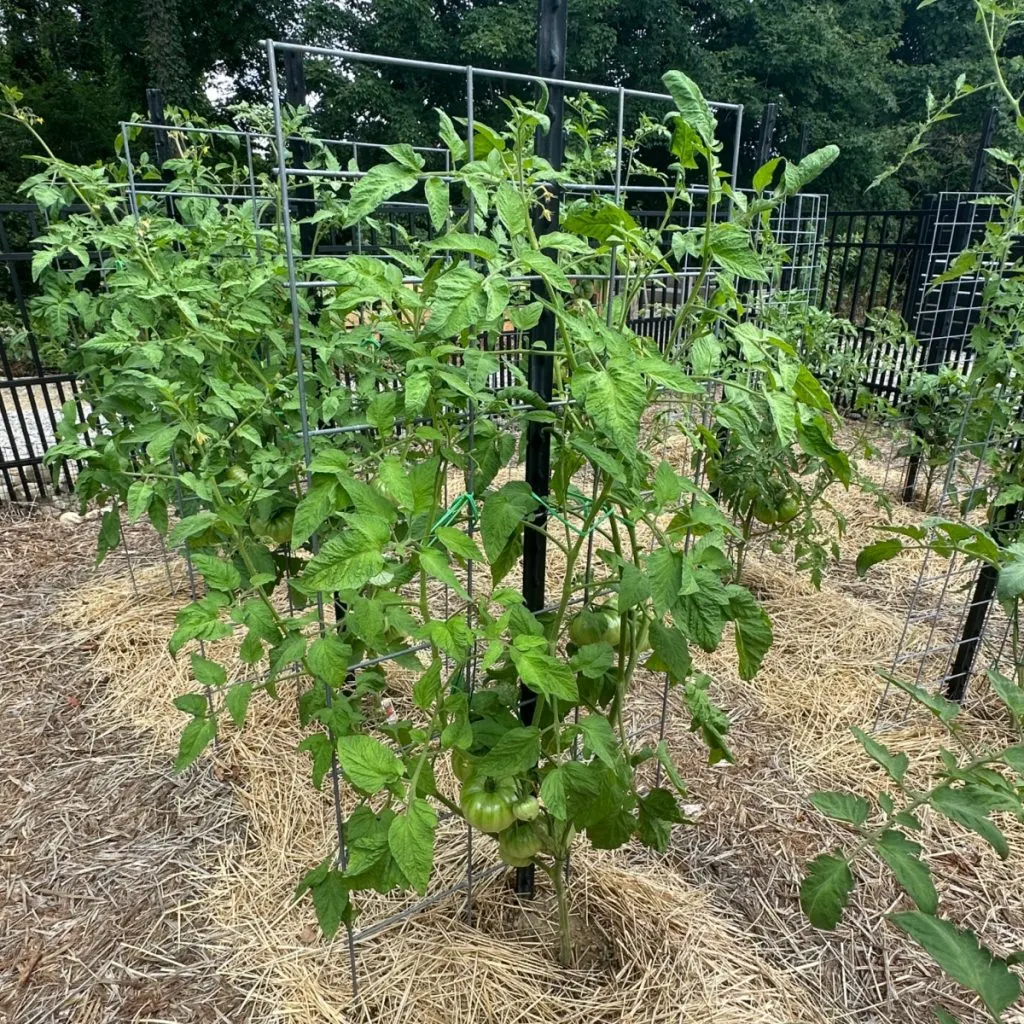
Below you will find 5 different materials that have proven to be the best in regards to support, practicality, and visual appeal to keep your garden looking great – and your tomato plants healthy and producing strong all year long!
What To Use To Tie Up Your Tomato Plants
Tying up your plants is important to protect them from toppling over during storms, strong winds and when they are full of almost ripe tomatoes. However, it is equally important to provide them with adequate support to keep them off of the ground so that they are less susceptible to damage from pests and disease.
Here is a look at 5 great options:
Cotton T-shirts
In addition to pantyhose, cotton t-shirts have long been a go-to material to tie up tomato plants. Once cut into strips, the material is able to hold the plants in place when tied to the stakes and cage. The flexible fabric allows for both growth and expansion as the branches get larger.
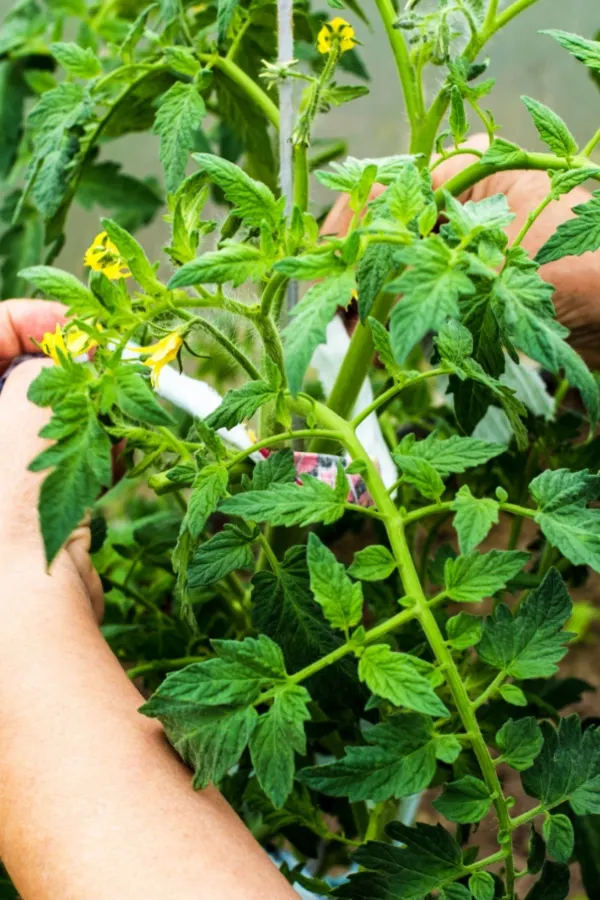
However, cutting up t-shirts year after year can become cumbersome as the fabric doesn’t typically last more than one growing year. In addition, for those who like a visually appealing garden, the array of various colors and patterns often make a garden look a bit unsightly.
Natural Cotton Yarn – The Best Materials To Tie Up Tomato Plants
Besides reusing old t-shirts and pantyhose, one of the most inexpensive materials to use to tie up tomato plants is 100% all-natural cotton yarn. It works incredibly well to provide enough support to keep the branches upright.
The yarn is not only strong, but more importantly it is soft and flexible. The yarn expands as the plants grow, preventing them from becoming damaged. Even better, yarn is extremely easy to pull and cut off in various lengths with standard household scissors.
For a few dollars, you can get 120 yards of material. This is usually more than enough to provide the average garden with plenty of tomato and pepper plant ties for an entire year. Best of all, if you purchase the yarn in green, the ties will blend in with the plant’s foliage and won’t be noticeable. (Affiliate Product Link: Green Cotton Yarn).
Garden Jute Twine – The Best Materials To Tie Up Tomato Plants
Another popular material to tie up tomato plants is garden twine, also commonly called jute. It is a very durable material and can easily support both small and large tomato plants.
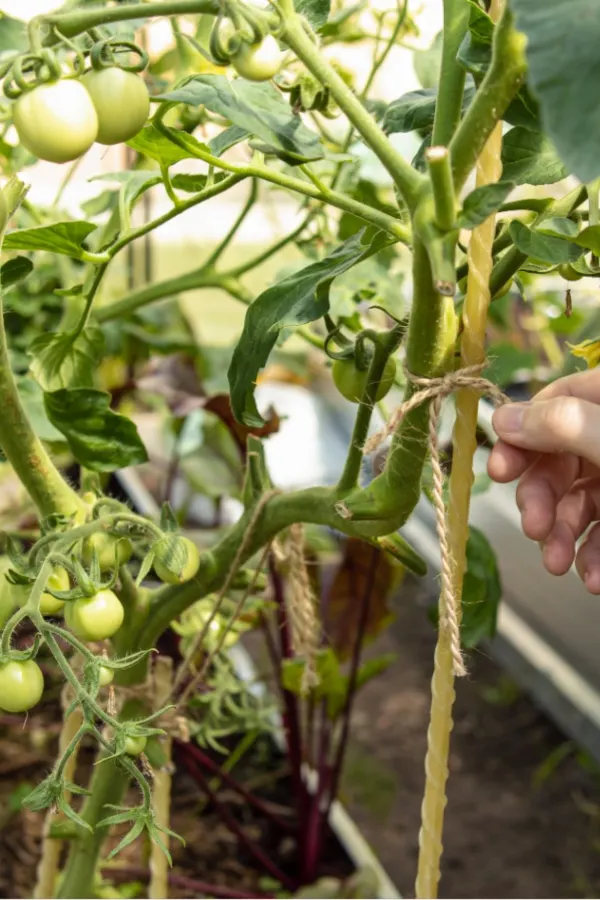
It comes in a small coil that can easily be taken into the garden. To use it pull one end of the twine and cut it to whatever length that you desire. Just be sure to not tie it tightly against the branches so that the plant can grow without any rubbing.
Although most twine comes in a tan color, you can also purchase jute twine that is green. This is once again great for making the twine less noticeable in the garden. Affiliate Link: Green Garden Jute Twine
Soft Stretchy Plant Tape – The Best Materials To Tie Up Tomato Plants
Similar to yarn and twine, soft stretchy plant tape comes in a roll and cuts easily to size. However, instead of being a thin strand of yarn, this material is thicker.
It is specifically designed to support both indoor and outdoor plants. Simply cut the tape to the desired size and tie it around your tomato stake or cage. The soft, flexible material will gently stretch as the plant grows, preventing damage to the branches as they expand.
Best of all, the material is eco-friendly. You can find specific Biostretch material that naturally biodegrades. This means it can safely be put into to your compost pile at the end of the garden season.
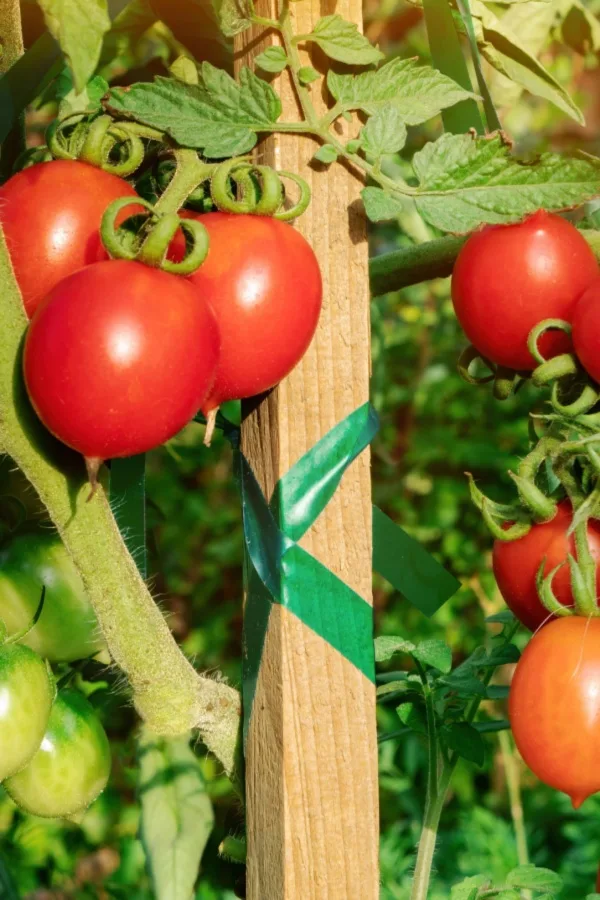
Reusable Nylon Plant Tie Straps
Very similar to a roll of self-attaching velcro, nylon plant tie straps have become a popular choice of material to tie up tomato plants over the last several years. They also come in a roll and cut easily to any length you need.
For tomato plants, place the soft side against the branches to protect the outer surface. Then overlap the tie straps by 2 inches, giving the plant adequate support as it grows. However, for extremely large tomato plants, like heirloom indeterminate plants, it is best to overlap the edges even more for extra stability. (See article: Determinate vs. Indeterminate Tomato Plants).
The straps can easily be adjusted to accommodate for unexpected growth and they can be reused year after year. As with the other products, it comes in green so the ties can blend well in the garden.
What Materials Not To Use To Tie Up Tomato Plants
The key to safely and effectively tying up tomato plants is to use a material that is sturdy. However, it must be flexible for growth. Materials that are too rigid and firm won’t allow the plant to safely grow. In addition, it can cause significant damage if the stem rubs up against them.
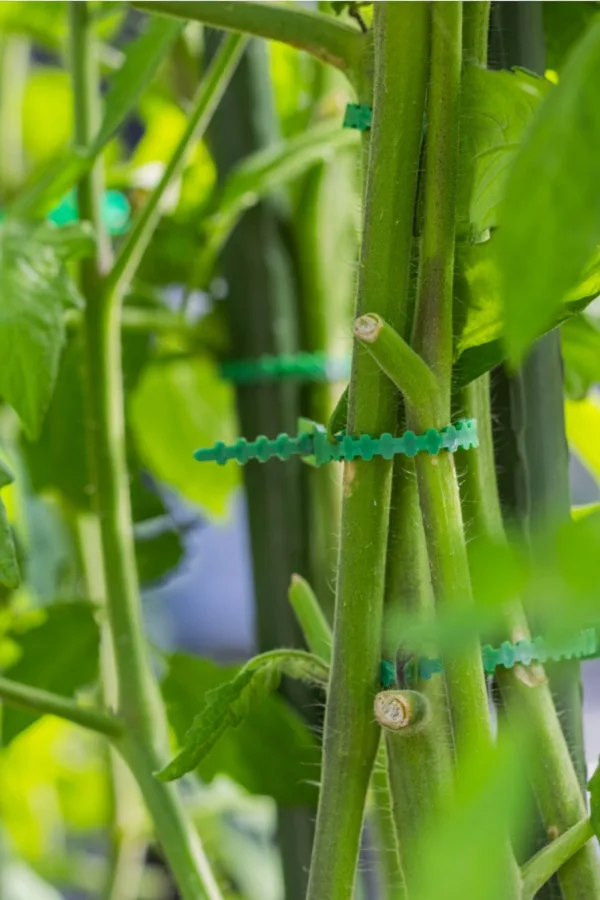
Although they are readily available at garden stores, products like metal floral wire, firm plastic ties or clamps and reusable zip ties that are advertised for tying up tomatoes aren’t recommended. Even though they can be a quick and easily solution for getting those branches the support that they need, they can actually cause more harm than good.
As the plants grow, these rigid products will eventually dig into the skin of the plants causing damage. And once a tomato plant becomes vulnerable they are at higher risk of disease and pest damage. Not to mention that the energy of the plant will switch to healing the wounds rather than producing more tomatoes.
Here’s to tying your tomato plants up for big success this year!
I Grow Tomatoes
Follow Our Facebook Page For Even More Great Tomato Growing Tips! I Grow Tomatoes Facebook Page
I Grow Tomatoes is a website created for those who love all things about tomatoes – from planting and growing – to cooking and canning! We publish two articles every week, 52 weeks a year. Sign up today to follow via email! This article may contain affiliate links.
